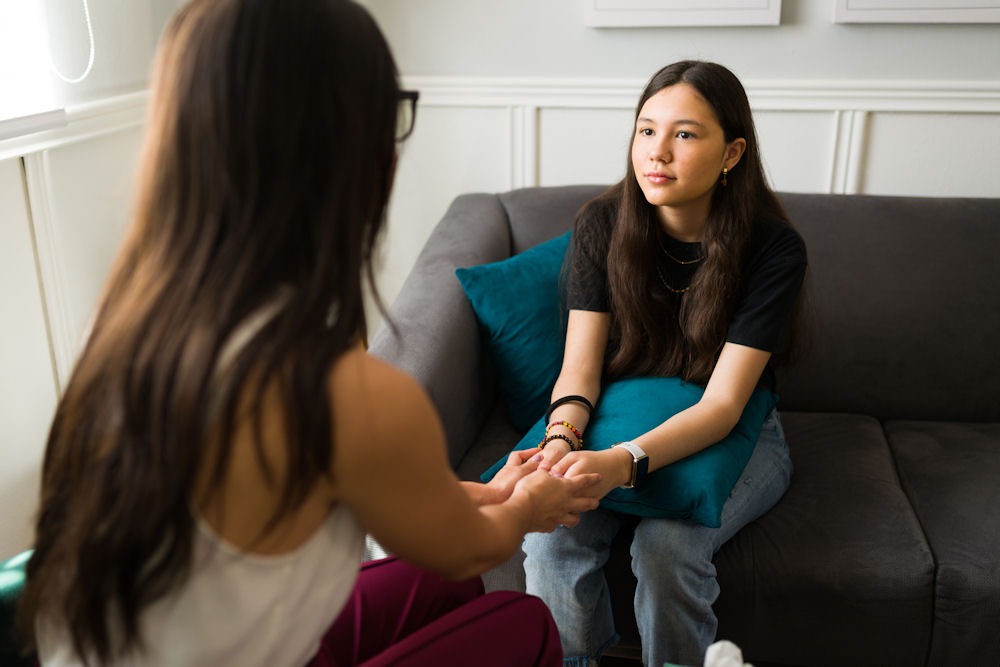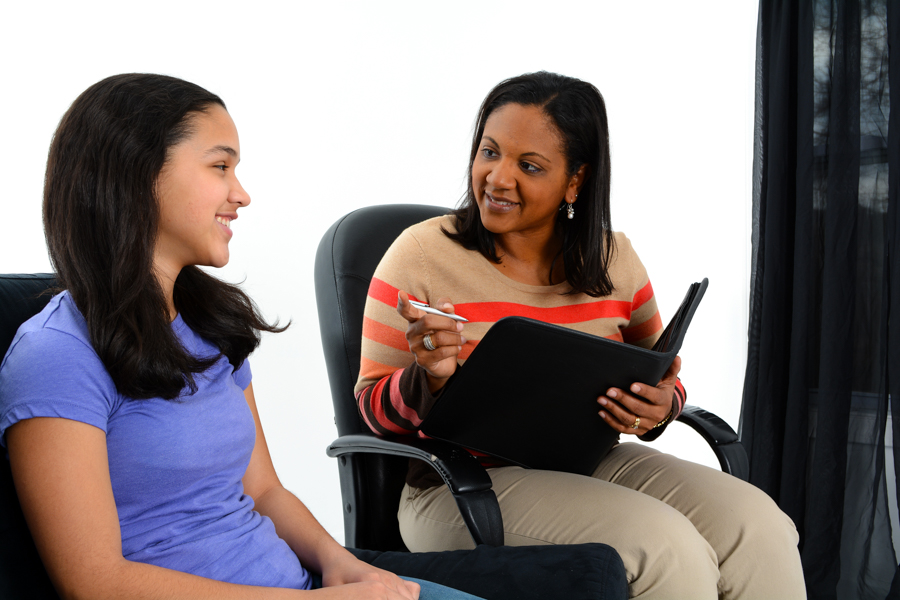Anxiety Treatment for Teens and Young Adults
“Our 16-year-old has been struggling with anxiety and severe depression and seemed stuck. We felt we had nowhere else to go. After 40 days, I feel like we’ve gotten our daughter back! It’s been a fantastic experience. She now has tools, perspective, improved self-love, and resilience we haven’t seen in two years.“
Signs of Anxiety Disorder
Anxiety treatment for teens and young adults is intended to address symptoms of anxiety and their impact on your child’s day-to-day functioning. Some mental and emotional anxiety symptoms to be aware of include:
- Severe, uncontrollable, persistent feelings of worry that intrude on one’s ability to concentrate on other tasks
- Frequent irritability or agitation, particularly when an individual sees their frustration as irrational or disproportionate to the incident that caused it
- A sense of restlessness, where one feels unable to relax
- A feeling that one is in danger or will experience danger or doom in the future
- Difficulty concentrating on tasks to an abnormal degree
- The presence of new and irrational fears, which may constitute phobias
Anxiety disorder is more than just a feeling or an emotional experience. In addition to the mental toll an anxiety disorder can take on an individual, it can also have pronounced physical and behavioral effects. These may be subtle and not interfere with one’s regular functioning, though in the case of severe anxiety and panic disorders, they are often impossible to ignore and downright debilitating.
Some of the physical symptoms of anxiety disorders include the following:
- Sweating
- Elevated or pounding heart rate
- Headache
- Dizziness
- Stomach issues
- Shortness of breath
- Muscle tension
- Rapid breathing
- Sleep issues
- Fatigue
Some of the behavioral symptoms of anxiety might include:
- Avoidant behavior, such as a withdrawal from socialization, school, work, or previously enjoyed activities
- Irritability in the form of a short temper
- Panic attacks occur when an individual feels intense fear and experiences physical manifestations of that fear (such as shaking, shortness of breath, or an elevated heart rate). The individual may believe they are suffering from a medical episode, such as a heart attack.
- Changes in appetite
- Excessive sleep, or a notable lack of sleep due to difficulty falling or staying asleep
Anxiety disorder can bring about many complex mental health struggles and may present differently from person to person. It’s worth noting that many symptoms of anxiety are shared with other physical and mental health disorders, so parents should be sure to monitor and communicate with their teenagers if they suspect anxiety to be present.

Contact Admissions Here and Receive a Prompt Call Back
TYPES OF DISORDERS ADDRESSED IN RESIDENTIAL TREATMENT FOR ANXIETY
Could your child benefit from a residential teen anxiety rehab program? While the term “anxiety” usually refers to generalized anxiety disorder, it can also be used as an umbrella term for several separate but related mental health conditions, all of which can be addressed in residential care. These include:
- Generalized anxiety disorder: This is the most common form of anxiety disorder and is characterized by consistent, difficult-to-control feelings of worry, which occur more days than not for six months or longer.
- Obsessive-compulsive disorder (OCD): An anxiety disorder characterized by excessive thoughts that lead to the development of repetitive behaviors. The excessive thoughts are known as “obsessions,” and the repetitive behaviors are called “compulsions.”
- Panic disorder: This disorder is characterized by bouts of intense fear and panic accompanied by strong physical reactions.
- Social anxiety disorder or social phobia: Social anxiety is characterized by fear, worry, self-consciousness, and withdrawal from certain social situations and interactions.
What Causes Anxiety Disorders?
Anxiety disorders often have biological causes. For instance, anxiety disorders can run in families, or they may sometimes result from physical conditions like hyperthyroidism or heart issues.
Traumatic or difficult life events and other underlying mental health issues can also contribute to the formation of anxiety, and people with certain personality types may be at greater risk of developing an anxiety disorder. Chronic stress and drug and alcohol abuse are other risk factors.
Discussing Anxiety Treatment With Your Child
Knowing how to help young adults with anxiety can be difficult. But if you believe your child may be struggling with anxiety symptoms, it may be time to discuss professional treatment, such as outpatient or residential treatment for anxiety.
Since young people may be hesitant about receiving treatment, parents can focus on communicating what anxiety is, how to recognize it, and what treatment options exist to help them cope with it.
Giving your teen or young adult child an idea of how treatment works and communicating your willingness to take their concerns seriously can break through common barriers and misconceptions that keep young people from asking for help. With this awareness, you and your child can have a deeper discussion of the causes of their anxiety and how to address them through treatment.
PARADIGM YOUNG ADULT AND TEEN ANXIETY TREATMENT CENTER
When it comes to anxiety treatment, California- and Texas-based Paradigm Treatment Center offers a multitude of evidence-based treatment modalities designed to address anxiety disorders in younger patients.
Anxiety treatment for young adults and teens can take different forms depending on the type of disorder one has, along with its severity and causes. Broadly, interventions can be therapy, medication, and/or lifestyle modifications.
Many people opt for therapy as a go-to treatment and only consider medication when more help is necessary. Others may choose to begin on medication immediately, particularly those struggling with severe anxiety disorders.
Therapy for Anxiety Treatment
Many evidence-based therapy approaches can help treat anxiety. Regardless of the methodology used, the goal of therapy for anxiety is to explore anxious situations and thoughts and teach new coping strategies and techniques so individuals can respond more helpfully. Some of the most common therapeutic forms used to address anxiety include:
- Cognitive Behavioral Therapy (CBT): CBT identifies the mental and emotional processes behind anxiety and similar mental health conditions. It helps individuals learn the situations that provoke their anxious thoughts or feelings and the kinds of anxious feelings and thoughts that occur frequently. They then replace these self-limiting and anxious thinking patterns with new, positive beliefs that enable positive action. CBT for anxiety may also include exposure therapy.
- Mindfulness-Based Cognitive Therapy: This is a variation of CBT. Anxiety is often compared to a “runaway train” where one thought or trigger can lead one down a long chain of what-if scenarios. Mindfulness therapy aims to help individuals develop an awareness of their bodily and emotional responses to experiences. By doing so, teens and young adults who suffer from anxiety can change their relationship to anxious thoughts, avoid falling into the traps of anxious thinking, and accept challenging feelings and emotions.
- Dialectical Behavioral Therapy (DBT): DBT teaches individuals to regulate their emotions with distress tolerance skills. It also encourages the development of healthy coping strategies for dealing with anxious feelings.
- Acceptance and Commitment Therapy (ACT): ACT is about accepting and recognizing thoughts and feelings as they occur. The goal is less about avoiding or “defeating” anxious thoughts and feelings and more about focusing on mindful behaviors and acting in accordance with one’s values. A focus on mindfulness and action naturally reduces anxiety and makes one better equipped to deal with anxiety when it does arise.
Group therapy and family therapy can also be helpful for those suffering from teen anxiety and are usually offered at a residential teen anxiety treatment center.
At Paradigm, we offer a minimum of four individual therapy sessions per week for our residents. These sessions help our young clients identify unhealthy coping mechanisms and replace them with healthy coping skills. Healthy coping mechanisms enable individuals to address things like low self-esteem, excessive worry, specific phobias, extreme fear, underlying trauma, and more.
Addressing Triggers in Therapy
“Triggers” are thoughts, events, or situations that bring up feelings of anxiety. Learning to recognize one’s anxiety triggers is an essential step in understanding the sources of anxiety and how to address them. This is often an important part of managing anxiety.

Medication for Addressing Anxiety
Many types of medications can help reduce anxiety symptoms. The most common class of these are selective serotonin reuptake inhibitors (SSRIs). These include drugs like Prozac, Paxil, and Zoloft. Benzodiazepines, like Xanax or Valium, can also address anxiety. However, they are taken on a more as-needed basis rather than daily, like SSRIs, due to their high potential for abuse. All medications carry potential side effects and should only be prescribed after consultation with a medical professional.
Lifestyle Modifications to Address Anxiety
Lifestyle modifications are likely not enough on their own to treat an anxiety disorder, but they can certainly help. Exercise, healthy nutrition, the maintenance of a regular sleep schedule, and the development of positive coping strategies like mindfulness, journaling, or meditation can all help those dealing with teenage anxiety.


RESIDENTIAL ANXIETY TREATMENT FOR TEENS AND YOUNG ADULTS
Residential treatment for anxiety in teens and young adults can provide a safe and supportive therapeutic environment away from home. When conducted properly, a residential mental health program offers an intensive level of individualized care and peer support, which is not achievable at home. It also gives teens and young adults the time and space to focus solely on tackling their mental health challenges.
A residential teen anxiety rehab program can be a great solution if your teen or young adult’s home environment is stressful or otherwise limiting to their growth or if other treatment options have not been effective. Our residential facilities for anxiety treatment in California and Texas offer young people a safe space to develop anxiety management skills and offer individuals the support they need to move forward.
ANXIETY TREATMENT FOR YOUNG ADULTS AND TEENS AT PARADIGM
Paradigm Treatment offers individualized treatment for teens and young adults facing anxiety and other co-occurring disorders in our intensive treatment programs. Our program provides daily individual therapy and incorporates group and family therapies, appropriate medications, a tight-knit and encouraging social environment, and a host of experiential treatments to address anxiety.
A significant barrier to getting appropriate anxiety treatment for young adults and teens can be a lack of knowledge of the condition or a misunderstanding of how it may be treated. To address common questions and sources of worry or hesitation, we offer residents and their families Psycho-Educational Services that present the facts about given conditions and their treatment program options. When clients and their families better understand the mental health or substance abuse challenges they experience, they feel less alone and can more easily engage in the treatment process.
With a small staff-to-client ratio, evidence-based care practices, and a strong focus on treatment tailored to the needs of the individual, the experienced and caring team at Paradigm will help your teen address their anxiety and co-occurring mental health disorders to achieve personal growth and success in all areas of life. Learn more about how our anxiety treatment program can help your family today. We look forward to helping your young loved one deal with anxiety and live in wholeness and health!
For more information on Paradigm’s treatment approach, or if you’d like to begin working with us to help your teen address their anxiety or other mental health issues, please give us a call today at (855) 921-4973.
Other Youth Mental Health Topics You May Find Helpful…
How to Ease Teen Anxiety When Starting at a New School
Whether it happens due to a cross-country move, a parental divorce, or because the old school wasn’t the best fit, your teen is likely feeling at least somewhat anxious and […]
Continue ReadingTeen Fears and Phobias: A Guide for Parents
You might know the names of some of the most common teen phobias. Arachnophobia, or the fear of spiders, was made famous by the 1990 comedy movie of the same name. […]
Continue ReadingHow Teen Anxiety Might Get in the Way of School Success
Teens are under a lot of pressure from parents and teachers. They have school, home, and social responsibilities. Although spending time with friends and classmates might not sound like hard […]
Continue Reading9 Simple Stress Relief Techniques for Teens
Today’s teenagers are under a lot of stress: Between school, extracurricular activities, after-school jobs, volunteer opportunities, and family obligations, adolescents can find their daily lives to be stressful. That’s not […]
Continue Reading



